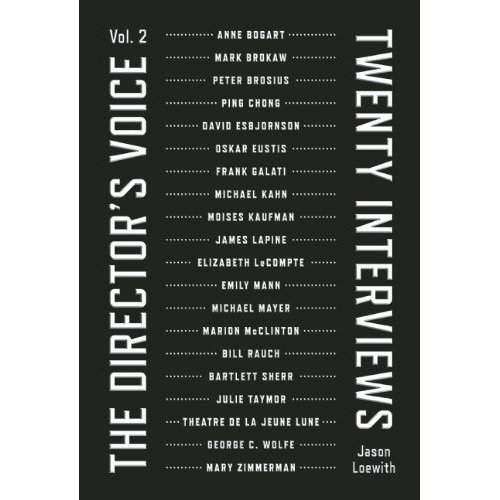The Director’s Voice: Volume 2
edited by Jason Loewith
TCG Books (Theare Communications Group)
Cover design by Mark Melnick
$22.00
www.tcg.org
Forward by Arthur Bartow, “The Director’s Voice”
Introduction by Jason Loewith, dramaturg, producer, playwright, director and Executive Director of the National New Play Network.
Includes interviews with Ping Chong, Anne Bogart, Julie Taymor, Mary Zimmerman, Michael Kahn and James Lapine, and many others.
Review by Kitty Drexel
Jason Loewith is filling some rather large shoes by editing and compiling the follow-up to Arthur Bartow’s “The Director’s Voice.” Loewith assures his audience that this second book is not a sequel but a continuation of the conversation started by the first. In it, he seeks to guide readers to a greater understanding of the director’s role as theater maker, actor ameliorator and money spender.
The average performance attendee assumes that theater should make as much money as any other commercial product. The directors in Loewith’s compilation have found a balance between making great art and making money. Although he occasionally casts illusions of grandeur on his subject matter, Loewith puts great significance in developing the craft of directing. The interviews in “The Director’s Voice: Volume 2” insists that any director can come to know and trust their own instincts when it comes to their craft as well as their budget.
Before each interview there is a detailed biography of the interviewed Director. Loewith’s interview questions are specific to the growth of individual artist. They include subjects such as career path, where/how they got their start, maintaining company finances, the stress of working with actors and where they find inspiration. There are photos from past production and performance details as necessary. He makes a point of asking his subjects their strengths and weakness. The interviews are not regimented; it is clear that Loewith saw these conversations as an opportunity to teach and mentor his audience.
This is not a “How-To” book for directors. It is an anthology that requires study and dedication.
Loewith, like Bartow before him, intends is to shine a light on the particular issues directors face. He postulates that, unlike actors and musicians, directors have a less rich history of teachers and techniques to fall back on. “The Director’s Voice: Volume 2” offers the next generation of directors an education in experience from successful predecessors that learned the hard way so they don’t have to.

